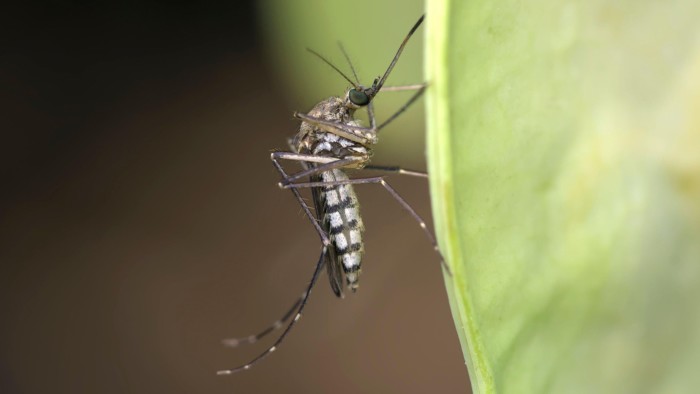Unlock the Editor’s Digest for free
Roula Khalaf, Editor of the FT, selects her favourite stories in this weekly newsletter.
West Nile virus has been detected in mosquitoes in Britain for the first time, in a sign of how climate change is driving tropical diseases into new areas.
Researchers found fragments of the pathogen’s genetic material in insects collected in Nottinghamshire during July 2023. While most West Nile virus infections are asymptomatic, they cause problems including fever in about one-fifth of cases and potentially fatal severe illness in about one in every 150 people.
The UK’s Health Security Agency said it was enhancing disease surveillance and control efforts in response to the discovery, adding that it assessed the risk to the public as very low. There was no evidence to suggest ongoing circulation of the virus in birds or mosquitoes in the UK, it said.
“The detection of West Nile virus in the UK is part of a wider changing landscape, where, in the wake of climate change, mosquito-borne diseases are expanding to new areas,” said Arran Folly, an arbovirologist or expert in arthropod-borne viruses at the UK’s Animal and Plant Health Agency. “Only through continued surveillance can we assess the risk to animal and public health.”
The virus was found in two out of 200 samples comprising 10 mosquitoes each gathered from wetlands on the River Idle near Gamston, UKHSA said. The pathogen typically circulates in birds but in rare instances mosquitoes can transmit it to humans and horses. Seven travel-associated West Nile virus cases have been identified in the UK since 2000, the agency said.
The Nottinghamshire mosquitoes could have been infected elsewhere and travelled to Britain, scientists said. Alternatively, they may have fed on a bird that had arrived in Britain after picking up the virus in another country.
Cases of mosquito-borne diseases such as dengue and Zika have been rising in Europe in recent years, fuelled by trade, travel and climate change. In 2023, the US suffered its first homegrown malaria cases for 20 years.
Global warming is bringing previously inhospitable countries into the zone of mosquito species such as the dengue-transmitting Aedes albopictus, known as the Asian tiger because of its striped white markings. It is also extending the seasons of the year during which mosquitoes are highly active.
“Climate change impacts on numbers and types of mosquitoes and allows emerging viruses to become established,” said Tom Solomon, director of The Pandemic Institute in Liverpool. “We are likely to see more of this [West Nile virus], and similar viruses, in the future.”
